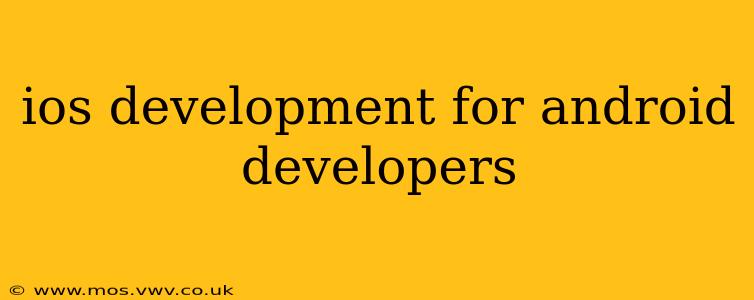Android and iOS developers often find themselves on opposite sides of the mobile development fence. While the core concepts of software development remain consistent, the specific tools, languages, and frameworks differ significantly. This comprehensive guide aims to bridge that gap, providing Android developers with a clear pathway to navigate the world of iOS development. We'll explore the key differences, highlight commonalities, and equip you with the knowledge needed to begin your iOS journey.
What are the Key Differences Between Android and iOS Development?
This is often the first question on the minds of Android developers considering the switch. The fundamental differences lie in the programming language, IDE, and the overall development environment.
- Programming Language: Android primarily uses Java and Kotlin, while iOS development relies on Swift (and, to a lesser extent, Objective-C). While the paradigms are similar, the syntax and specific libraries are unique to each platform.
- IDE: Android developers typically use Android Studio, a powerful IDE built around IntelliJ IDEA. iOS developers utilize Xcode, Apple's integrated development environment, which provides a streamlined workflow optimized for Apple's ecosystem.
- UI Frameworks: Android utilizes XML layouts alongside Java/Kotlin code for UI construction, whereas iOS developers use SwiftUI (or UIKit) – a declarative framework that allows for building intuitive and dynamic user interfaces.
- Build Systems: Gradle is the standard build system for Android, managing dependencies and compiling the application. Xcode uses its own build system to handle the compilation and packaging of iOS apps.
- Testing: While unit testing principles remain the same, the tools and frameworks for testing differ considerably between Android (e.g., JUnit) and iOS (e.g., XCTest).
How Much Easier is iOS Development than Android Development?
This is subjective and depends on your prior programming experience and preferences. While some developers find the more structured environment of Xcode and Swift more intuitive than Android Studio and Java/Kotlin, others find the opposite to be true. The learning curve is largely dependent on individual aptitude and the chosen learning resources. However, both platforms offer ample documentation and community support.
What are the Similarities Between Android and iOS Development?
Despite the differences highlighted above, many similarities exist that can make the transition smoother for Android developers:
- Object-Oriented Programming: Both platforms are built upon object-oriented programming principles, allowing for reusable code and well-structured applications.
- Design Patterns: Many common design patterns, like MVC (Model-View-Controller) and MVVM (Model-View-ViewModel), are applicable to both platforms. Understanding these patterns will significantly aid your transition.
- Version Control: Git remains the dominant version control system, regardless of the platform. Your expertise with Git will be directly transferable.
- Debugging and Profiling: Both platforms provide robust debugging tools to identify and fix issues within your code. The underlying principles of debugging remain largely the same.
Is it Worth Switching to iOS Development?
The decision of whether or not to switch to iOS development is a personal one, depending on your career goals and interests. The iOS market is significant, and mastering iOS development opens up new opportunities. However, if you are content with your Android development skills and career path, then there is no need for a switch. Consider your professional ambitions, market demand in your region, and your personal enjoyment of the technology before making a decision.
What Languages Do I Need to Learn for iOS Development?
Swift is the primary language for iOS development. While Objective-C is still present in legacy codebases, it's generally recommended to focus on Swift for new projects. Learning Swift shouldn't be too challenging for experienced programmers, particularly those already familiar with object-oriented languages like Java or Kotlin.
What is the Best Way to Learn iOS Development?
Apple provides extensive documentation and tutorials on its developer website. Numerous online courses, bootcamps, and books also cater to iOS development. Hands-on practice is key; start with small projects to solidify your understanding and gradually increase complexity.
This guide offers a foundational understanding of the landscape for Android developers looking to enter the world of iOS development. The transition requires dedication and effort, but the rewards, both professionally and personally, can be significant. Remember to utilize available resources and embrace the learning process. Good luck!
